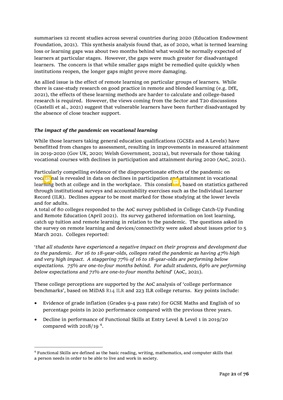
Page 21 of 76
summarises 12 recent studies across several countries during 2020 (Education Endowment
Foundation, 2021). This synthesis analysis found that, as of 2020, what is termed learning
loss or learning gaps was about two months behind what would be normally expected of
learners at particular stages. However, the gaps were much greater for disadvantaged
learners. The concern is that while smaller gaps might be remedied quite quickly when
institutions reopen, the longer gaps might prove more damaging.
An allied issue is the effect of remote learning on particular groups of learners. While
there is case-study research on good practice in remote and blended learning (e.g. DfE,
2021), the effects of these learning methods are harder to calculate and college-based
research is required. However, the views coming from the Sector and T20 discussions
(Castelli et al., 2021) suggest that vulnerable learners have been further disadvantaged by
the absence of close teacher support.
The impact of the pandemic on vocational learning
While those learners taking general education qualifications (GCSEs and A Levels) have
benefitted from changes to assessment, resulting in improvements in measured attainment
in 2019-2020 (Gov UK, 2020; Welsh Government, 2021a), but reversals for those taking
vocational courses with declines in participation and attainment during 2020 (AoC, 2021).
Particularly compelling evidence of the disproportionate effects of the pandemic on
vocational is revealed in data on declines in participation and attainment in vocational
learning both at college and in the workplace. This consistent, based on statistics gathered
through institutional surveys and accountability exercises such as the Individual Learner
Record (ILR). Declines appear to be most marked for those studying at the lower levels
and for adults.
A total of 80 colleges responded to the AoC survey published in College Catch-Up Funding
and Remote Education (April 2021). Its survey gathered information on lost learning,
catch up tuition and remote learning in relation to the pandemic. The questions asked in
the survey on remote learning and devices/connectivity were asked about issues prior to 5
March 2021. Colleges reported:
'that all students have experienced a negative impact on their progress and development due
to the pandemic. For 16 to 18-year-olds, colleges rated the pandemic as having 47% high
and very high impact. A staggering 77% of 16 to 18-year-olds are performing below
expectations. 75% are one-to-four months behind. For adult students, 69% are performing
below expectations and 71% are one-to-four months behind' (AoC, 2021).
These college perceptions are supported by the AoC analysis of 'college performance
benchmarks', based on MiDAS R14 ILR and 223 ILR college returns. Key points include:
• Evidence of grade inflation (Grades 9-4 pass rate) for GCSE Maths and English of 10
percentage points in 2020 performance compared with the previous three years.
• Decline in performance of Functional Skills at Entry Level & Level 1 in 2019/20
compared with 2018/19 4
.
4
Functional Skills are defined as the basic reading, writing, mathematics, and computer skills that
a person needs in order to be able to live and work in society.